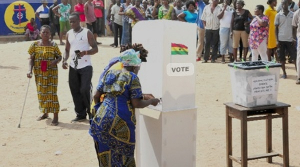- Home - News
- TWI News | TV
- Polls
- Year In Review
- News Archive
- Crime & Punishment
- Politics
- Regional
- Editorial
- Health
- Ghanaians Abroad
- Tabloid
- Africa
- Religion
- Election 2020
- Coronavirus
- News Videos | TV
- Photo Archives
- News Headlines
- Press Release
General News of Saturday, 1 September 2012
Source: Daily Guide
Youth Unemployment Threatens National Security
Governance experts have warned that the growing unemployment rate among Ghanaian youth is likely to become a serious national security threat.
They advised that the menace should be tackled urgently before it was too late when they became major catalysts for civil unrest in the country.
These experts including, researchers, politicians, and civil society groups converged at the Institute of Democratic Governance (IDEG) on Wednesday. In their deliberations, the threat posed by the astronomical growth of youth unemployment was on top of their discussions.
According to The Director of Legon Centre for International Affairs, Professor Henrietta Mensa-Bonsu, the threat was becoming serious: “Youth unemployment is a major security threat, and we should start seriously thinking about what to do,” she said.
The experts present at the IDEG forum included the Executive Director of IDEG, Dr. Emmanuel Akwetey, Kofi Bentum Quantson, former head of the Bureau of National Investigation, Cardinal Peter Appiah-Turkson and several other civil society groups. They concluded that the idleness of unemployed youth in the country could make them an easy prey to troublemakers, as the December 7 general elections approached.
“Young people who don’t have a stake in the future would do anything, but young people who have hope would think twice before they accept things, so let us focus on youth unemployment so that the Ghanaian youth can live decent lives,” noted Prof. Mensa-Bonsu.
She said perhaps presidential commission was needed to focus on what to do with youth unemployment as it was the young and energetic that went to war and not the old.
It was estimated there were about 500,000 unemployed graduates in Ghana. Indeed, last year, the Vice Chancellor of the University of Ghana, Legon, Prof. Ernest Aryeetey predicted a rise in graduate unemployment in the country.
In his projections, about 50 percent of university graduates would be jobless two years after their national service, whilst 20 percent will use the three-year period after National Service looking for jobs.
It was estimated that approximately 20,000 students graduated from the various tertiary institutions in the country every year. Less than half of these graduates got any shot at decent jobs after their mandatory one-year National Service.
The Unemployed Graduate Association of Ghana (UGAG) has become the rallying point for these disgruntled graduates who have staged several protests to hammer home their dilemma.
On Thursday, August 20, 2012, the UGAG was scheduled to hit the streets of Kumasi in a massive protest to register their displeasure.
In a statement issued and signed recently by the spokesman for UGAG, Desmond Biney, he said the leadership of the group would be embarking on a nationwide tour in the coming days to meet with its members to strategise and mobilize themselves for a plan of action. According to him, the event “will be a major event to register our displeasure to the current order.”
“Many of the times, when we try to explain our predicaments, people tend to call us lazy. They think we are people who are not willing to do anything good with our lives, thus, calling ourselves unemployed graduates,” he complained.











